Oscars Night: Re-Watching Late Carl Weathers' Apollo Creed In 'Rocky' Worth It
NEW ORLEANS - It's Oscars Sunday.
The nominees for the Academy Award for best picture tonight (7 p.m., ABC) are Oppenheimer, American Fiction, Anatomy of a Fall (not the Bill Belichick Story), The Holdovers, Killers of the Flower Moon, Maestro, Past Lives, Poor Things, Zone of Interest, and for some reason, Barbie.
To get you in the mood today or throughout the coming weeks as folks like to flock to to see Oscar winning flicks, might I suggest a true champion movie to re-watch.
Rocky Is One Of Greatest Sports Movies
"Rocky," the 1976 classic starring then little-known Sylvester Stallone as a down-and-out boxer Rocky Balboa in Philadelphia, received 10 nominations for the 1977 Academy Awards. It won three - best picture, best director (John G. Avildson) and best film editing (Richard Halsey, Scott Conrad).
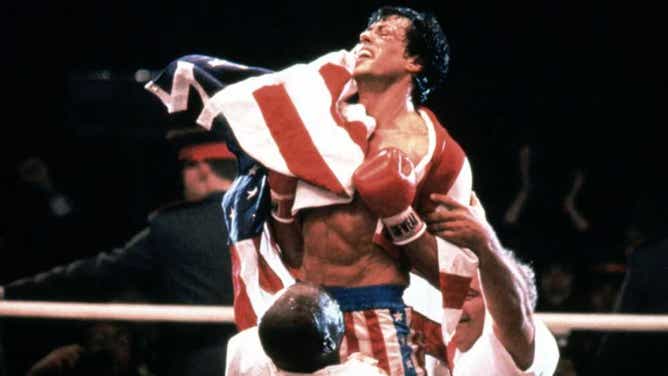
Sylvester Stallone as boxer Rocky Balboa in the 1977 Best Picture Academy Award winner, "Rocky." (Getty Images).
The movie launched the superstar career of Stallone and a string of sequels. Interestingly, though, a supporting actor's role as Muhammad Ali-type Apollo Creed stole the show, and (spoiler alert) he won the fight at the crux of the movie against Balboa.
New Orleans native and former Oakland Raider linebacker (in 1970) Carl Weathers played Ali better than maybe even Ali in his portrayal of Creed. Weathers also went on to quite a career in the Rocky franchise along with other film roles in Predator (1987), Action Jackson (1988), Happy Gilmore (1996) and memorable television stints in Arrested Development (2004-13), Chicago Justice (2017) and The Mandelorian (2019-23).
Weathers died at age 76 of heart issues last Feb. 1 in Los Angeles, which motivated me to watch the movie again. And you should, too.
Stallone is awesome in his first and maybe best role. But in many ways, Weathers steals the show, even though he is only in a handful of scenes.
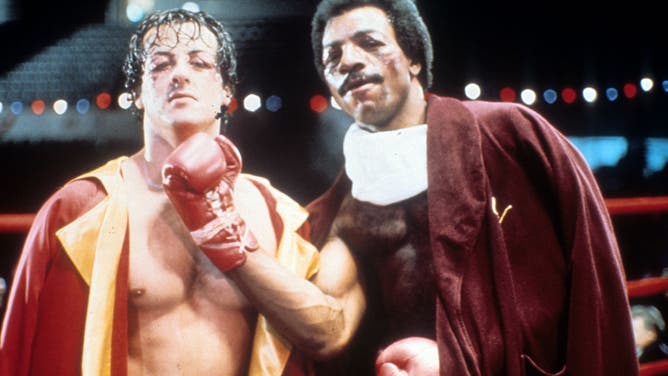
Carl Weathers (right) with Sylvester Stallone during a break in filming of "Rocky" in 1976. (Photo by United Artists/Getty Images)
We first see Weathers as Creed after Balboa wins a low budget fight late in 1975 and is at a local bar. Creed is on the television behind the bar bragging about his next fight against Mac Lee Green in Ali-exquisite vocabulary to be held on Jan. 1, 1976 - the first day of the country's bicentennial year of celebrations.
"This is going to be the greatest event in the country's history - a gala occurrence with me beating Green like he committed a crime," Creed says. "In keeping with great events throughout the country's history, Apollo Creed will duplicate the cracking of the Liberty Bell by cracking Mack Lee Green."
I didn't think of this at the time, but this is a black man saying this in a 1976 movie. And this is refreshingly not a political or racial movie of any type whatsoever. It is just a slice of life in the boxing world and feels realistic, considering how Ali largely ran his own career.
"All you get today is clowns," Rocky's friend Paulie Pennino complains.
Rocky doesn't like the comment and says, "Clown?"
Rocky Has Racial Undertones To It, But Refreshingly Not Much
And that's about as racial as the movie gets. What is interesting, though, and I didn't notice it when I saw it at age 15 is the fact that many of the blacks in the movie are more successful than the whites.
Creed is a rich, well-spoken man with a spacious, fancy office who sends his barber to fight locales for a fresh cut and runs his own career - not some white guy. He tells his white secretary to fetch him more coffee. And Balboa lives in a near slum in south Philly.
"Stay in school and use your brain," Creed tells young fans with an Ali rhyme. "Be a doctor. Be a lawyer, carry a leather briefcase. Forget about sports as a profession. Sports make you grunt and smell, see. Be a thinker, not a stinker."
We next see Creed in an urgent business meeting in a sharp, gray suit. Green has dropped out of the fight because of an injury. Ever the promoter like Ali, Creed needs a new foe for the July 4 fight. And we basically see a light bulb appear over his head.
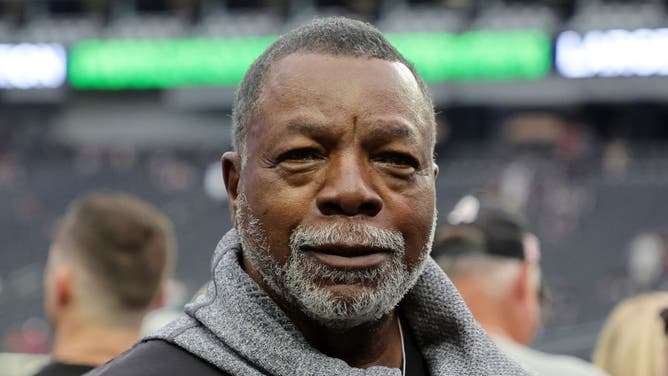
Former Oakland Raider Carl Weathers stands on the Las Vegas Raiders sideline before their game against Houston at Allegiant Stadium on October 23, 2022, in Las Vegas. (Photo by Ethan Miller/Getty Images)
"Without a ranked contender available, what this fight is going to need is a novelty," he muses. "This is the land of opportunity, right? So, Apollo Creed on January 1 gives a local underdog fighter an opportunity - a snow-white underdog. And I'm going to put his face on this poster with me. And I'll tell you why, because I'm sentimental. And a lot of people in this country are sentimental, and there's nothing they'd like to see better than Apollo Creed give a local Philadelphia boy a shot at the greatest title in the world on this country's biggest birthday. Now, THAT'S the way I see it, and that's the way it's going to be."
The white promoter, George Jergens, says, "I like it. It's very American."
Creed disagrees. "No, Jergens, it's very smart."
Yes, Weathers stole the show. He was dynamic.
Carl Weathers Was Not A Fighter, But Looked The Part
"Carl looked like a fighter," Weathers' football teammate Noel Foucher from the St. Augustine High Purple Knights football team in the mid-1960s told OutKick.
"He was always well built," Foucher said. "I think he was in much better shape than Ali. But that's who he reminded everyone of in the movie. He was always well-spoken in high school. The guy was talented. He could sing, too."
Stallone obviously got most of the acclaim from the film, but Weathers got his share.
"Oh, it made him famous," Foucher said. "It was funny. In the movie, he was this big talker. But in high school, he was a real quiet guy. Of course, we had some real rough guys on those teams. You had to be careful in the locker room. We always knew he was out there as an actor, but everybody knew him after that movie."
What didn't garner a lot of attention was a black man in the movie giving a white guy a break and telling the white promoter how it will be done … in 1976.
"Rocky," without saying so, showed how race relations can work harmoniously. Race-baiting USA TODAY might not have known what to do with that, had it existed at the time.
This is why black actor Morgan Freeman famously told Mike Wallace in 2005 on "60 Minutes" why he does not like February's Black History Month.
"It's ridiculous," he said. "You're going to relegate my history to a month? What do you do with yours?"
Wallace said he is Jewish and agrees that he does not want a Jewish History Month.
"Black history is American history," Freeman says. "Stop talking about it. I'm going to stop calling you a white man, and I'm going to ask you to stop calling me a black man."
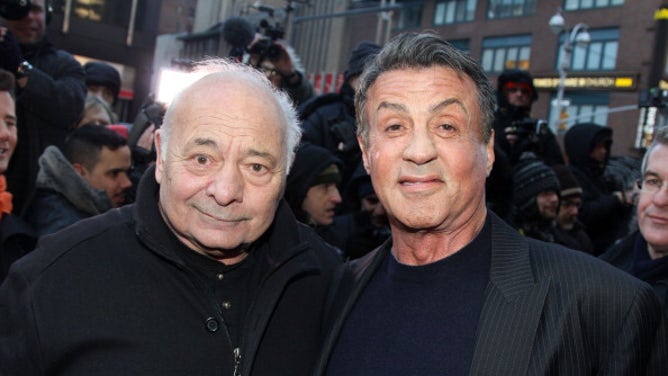
Burt Young (left) and Sylvester Stallone attend the "Rocky" Broadway opening night at The Winter Garden Theatre on March 13, 2014 in New York City. Young passed away last Oct. 8. (Getty Images).
Stallone didn't talk about the role reversal in his movie. It was subtle and one of the more interesting pieces about the film, particularly because no one ruined it by "talking about it," as Freeman would say.
But back to the movie.
Creed and Jergens find Rocky, and Creed loves his nickname, "the Italian Stallion."
"It's the name, man - the Italian Stallion," Creed says. "The media will eat it up. Now, who discovered America? An Italian, right (Christopher Columnbus)? What would be better than to get it on with one of his descendants? I'll drop him in three."
Creed smiles.
"Apollo Creed meets the Italian Stallion! Sounds like a damn monster movie," he says.
Proud of his idea, Creed later says, "After the fight, I may just retire and run for emperor."
Creed settles for a black George Washington riding into the fight on a float and throwing money. Then he mimics that Uncle Sam poster. "I want you," he says to Balboa.
But the best thing about this movie and what makes it one of the greatest sports movies of all time is the fight after the delicious appetizers leading up to it.
The Boxing In The Movie Is Great
It's the ultimate upset movie.
I saw it in a packed theater in Metairie, a suburb of New Orleans. And it was like being at a game or an Ali fight. Most in the theater went into the movie fresh without knowledge of what would go down from newspaper stories or TV, which is the best way to see a movie. And most expected Balboa to get knocked out in three as the movie said. This added to the drama of what was about to happen.
The fight starts with Creed dancing like Ali and just setting Balboa up. Then he starts pounding him in the face. The end appears near.
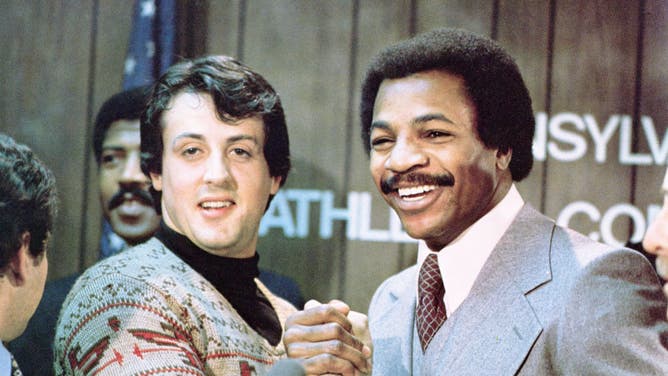
Sylvester Stallone (left) and Carl Weathers at a press conference scene for the 1976 "Rocky" movie that won Best Picture at the Oscars in 1977. (Getty Images)
"It looks like Rocky is blocking the blows with his face," a ring side announcer says, and a lot of us started cracking up. Because that's exactly what it looked like.
Can you imagine? "Oh, let me block this right with my forehead," Balboa was saying.
Then, out of nowhere, Rocky lands a huge punch to Creed's face, and I mean the theater exploded.
It was like the Saints, who were 2-12 in 1975 for their ninth straight losing season, just took a lead in a Super Bowl. And the intensity in the theater never decreased from that point.
You must see it again.
And let me know what you think. Email me at glenn.guilbeau@outkick.com or via X @SportBeatTweet.